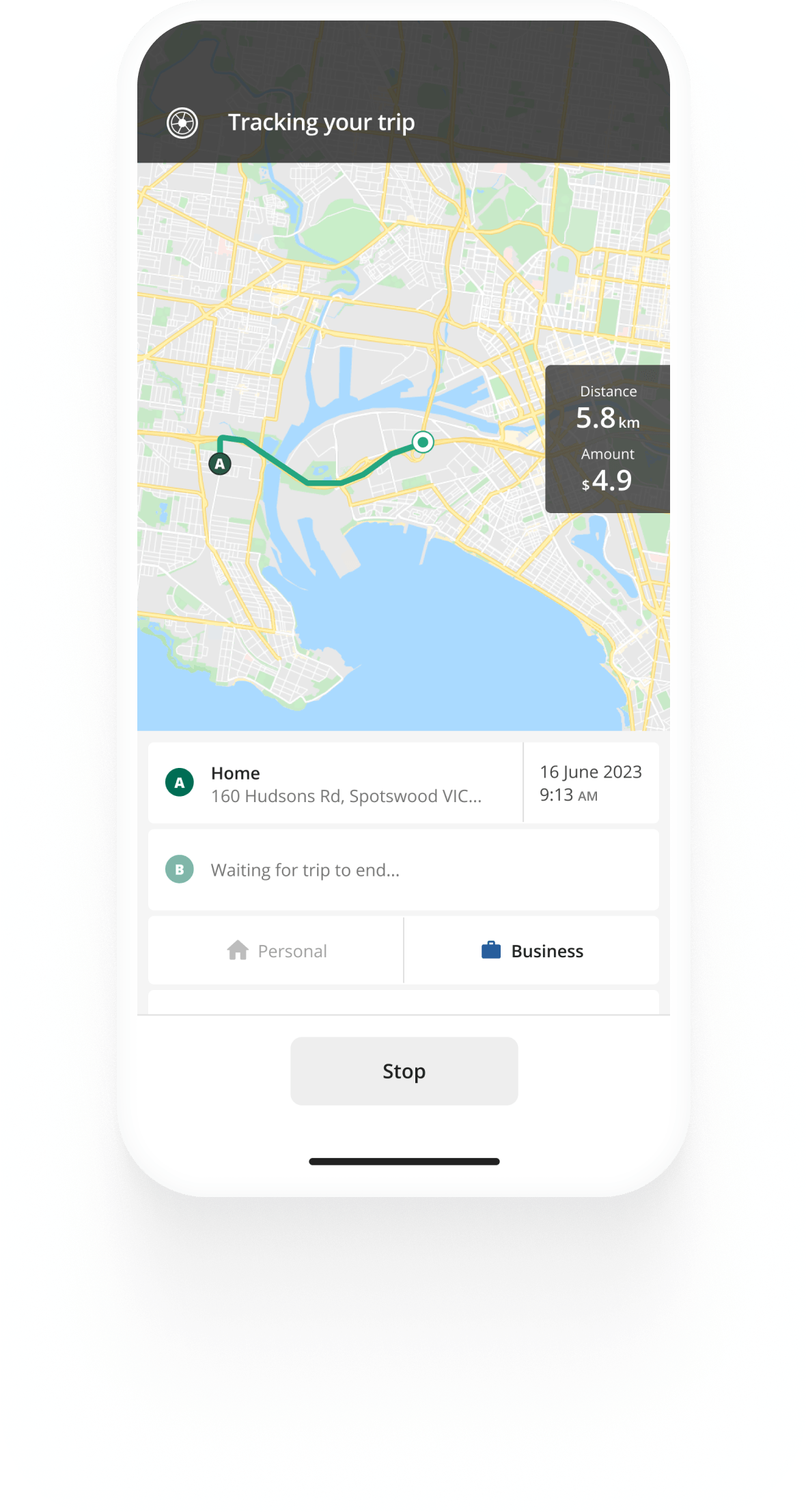Track mileage automatically
Get started.svg)
Writing Off a Car For Business in Australia
If you drive for work-related purposes, be it visiting client sites, conferences, business meetings, or any number of other reasons, you might qualify for a business tax write-off on your car.
It’s one of many company car tax benefits; you can read our other guide for more benefits or items you could write off.
Vehicle expenses you can write off
The business usage component of your company car can be claimed as a tax deduction. This includes:
- The purchase price
- Interest on borrowing
- Fuel
- Maintenance


Kilometre tracking made easy
Trusted by millions of drivers
Automate your logbook Automate your logbook

Automatic mileage tracking and ATO-compliant reporting.
Get started for free Get started for freeATO limit on the car price you can claim
When buying a car for a business tax write-off, there is a maximum amount that you can claim imposed by the ATO, called the car limit.
The amount is $69,674 for the 2024/25 financial year.
Keep in mind that the car limit is applied prior to accounting for business usage.
Example
If you purchased a car for $80,000 and your vehicle logbook showed 90% business usage and only 10% personal, then the maximum amount you can claim would be 90% of $69,674, or $62,706.6.
See the section below for how to work out your business vs personal usage split on all your driving.
How to claim the write-off
You can choose to depreciate the car over several years or claim it as a one-off cost on purchase.
To claim as a one-off cost, it must meet the Small Business Entity (SBE) instant asset write-off rules. The eligibility depends on:
- The annual turnover of your business
- Purchase date of the asset (in this case, vehicle)
- Date when it was first used
- Cost of the asset being less than the claimable car tax deduction limit ($69,674)
Instant asset write-off limit
A limit of $20,000 is currently in place for assets first used between 1 July 2023 and 30 June 2025, for businesses with an aggregated turnover of less than $10 million.
You can find the full list of purchase dates and limits for instant write-off on the ATO website.
The car limit also applies to depreciating a vehicle purchase, and you cannot claim anything more than the car limit for tax purposes.
You can only depreciate a car from the date it was first used, whereas if you write off the entire amount of the vehicle, you can claim the purchase price up to a maximum of the car limit as a tax deduction for that financial year.
Also read: Claim Motor Vehicle Depreciation from the ATO
Choose the right method for your business-related driving deduction
There are two ways of claiming a car as a tax deduction: the cents per kilometre method, or the logbook method.
You can’t use a combination of both methods in one financial year. You can, however, choose whichever method gives you the biggest benefit.
The logbook method would likely be more appropriate when buying a car for a business tax write-off, but you would need to look at your own situation.
| For a more comprehensive comparison of the two, read: The Logbook Method vs The Cents per KM Method |
If your company car has personal usage, then you also need to consider the impact of car Fringe Benefits Tax (FBT) on your purchase.
You should speak with a registered tax professional about your individual circumstances to help you determine the best way to proceed.
Work out the business usage with a digital vehicle logbook
If you use a company car for both business and personal use, you’ll have to find out the percentage of business vs personal trips. A digital vehicle logbook like Driversnote can be a handy solution that’ll save you time and pen and paper calculations. The Driversnote app allows to categorise trips as “business” or “personal” with a click of a button.
FAQ

Tired of logging mileage by hand?
Effortless. ATO-compliant. Liberating.
Latest posts
- Hiring Employees as a Sole Trader
- Employers' Guide to FBT-Exempt Benefits
- Work-Related Travel Expenses for Employees
Related posts
ATO Mileage Guide
25 June 2024 - 5 min read
Learn about the rules of reimbursing employees for their car expenses or deducting expenses as an employee or self-employed individual.
Hiring Employees as a Sole Trader
15 April 2025 - 5 min read
How to hire employees as a sole trader in Australia and the main obligations and considerations in doing so.
How to Write Off a Car for Business in Australia
15 April 2025 - 2 min read
Don't miss out on writing off a car for business - it may be the largest deduction you can claim as a business owner. See the 2024/25 ATO rules.

.svg)